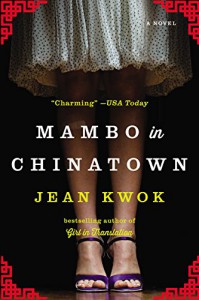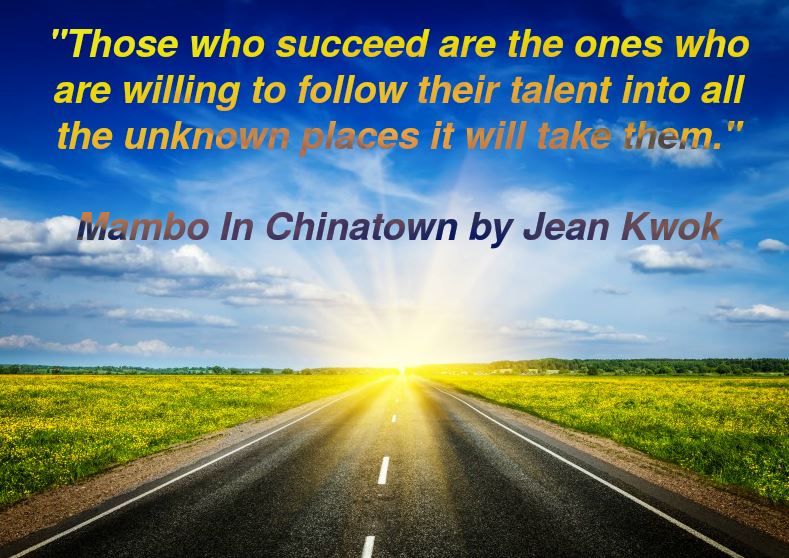

Twenty-two-year-old Charlie Wong grew up in New York’s Chinatown, the older daughter of a Beijing ballerina and a noodle maker. Though an ABC (America-born Chinese), Charlie’s entire world has been limited to this small area. Now grown, she lives in the same tiny apartment with her widower father and her eleven-year-old sister, and works—miserably—as a dishwasher. But when she lands a job as a receptionist at a ballroom dance studio, Charlie gains access to a world she hardly knew existed, and everything she once took to be certain turns upside down. Gradually, at the dance studio, awkward Charlie’s natural talents begin to emerge. With them, her perspective, expectations, and sense of self are transformed—something she must take great pains to hide from her father and his suspicion of all things Western. As Charlie blossoms, though, her sister becomes chronically ill. As Pa insists on treating his ailing child exclusively with Eastern practices to no avail, Charlie is forced to try to reconcile her two selves and her two worlds—Eastern and Western, old world and new—to rescue her little sister without sacrificing her newfound confidence and identity.
Amazon.com
POTENTIAL TRIGGER WARNING: This novel briefly touches upon the themes of sexual assault and rape culture.
Cha Lan "Charlie" Wong, the daughter of Chinese immigrants, has never been outside the city limits of Chinatown in New York City. Now 22, she's spent years keeping mostly to herself, working as a dishwasher in the same restaurant where her father is employed as a skilled noodle maker.
Life has been a constant struggle for Charlie. She did poorly in school and even now in adulthood is described as homely, uncoordinated, no domestic skills to speak of, not tech savvy in the least... in short, nobody expects much of her. Knowing this, Charlie is stunned when her younger sister Lian Hua ("Lisa") urges her to apply for a receptionist position that just opened up at a local ballroom dance studio.
Charlie is awkward during the interview process but one of the co-owners sees something in her and decides to give her a chance. The reader is then given a front row seat to Charlie bumbling through this receptionist position. Still, she becomes fascinated with the world of dance -- the studio instructors, the different students and their backstories -- it undeniably leaves her feeling very much out of her element, yet she persists in making this job work so that she can keep her grasp on this new and beautiful world she's been brought into.
When one instructor is suddenly unable to teach a beginner's class, Charlie is shocked to hear she's been recommended to pose as the teacher. Just for that one class... but still! As it turns out, the students in this class interpret her uncertainty in her abilities as Charlie actually being very down-to-earth and relatable. Suddenly, Charlie is approached with requests to teach more classes! Though she accepts, she quietly starts taking dance lessons between classes so she can move from imposter to legit instructor. This move turns out to be empowering and life-changing. For one, in the past whenever tomboyish Charlie would make attempts to get all girly and pretty, someone in the family would immediately shoot down her efforts, so she would quickly go back to her old routine. NOW, after getting a little rhythm and soul in her bones, she finds the boldness to snap back and inform people that such "primping" as some might call it, makes her feel good... and it's her right. So, there.
Through Charlie's journey, author Jean Kwok explores not only the hard truth about the world of dance -- the discomfort that comes along with training your body to move a certain way; the surprisingly high cost of the proper shoes; ruined, blistered feet; certification exams, etc. -- but also family hardships. We see Charlie tackle emotions surrounding the process of emotionally letting go of familial or societal expectations (her family finds a multitude of ways to try to guilt her into staying the same rather than encouraging emotional growth or pursuing soul-fulfilling dreams), finding courage to forge her own path, discovering and embracing who she truly is. Kwok also weaves in themes not uncommon to many immigrant experience novels: she, through her characters, asks "How does one blend old and new? How do we move with the tide of modernism while still properly honoring one's heritage... can it be done?". *Note: Though Charlie is American-born, much of the immigrant story is told through the experiences of her immediate & extended family, as well as Charlie's own observations of what comes along with being the child of immigrants.

When a family member falls seriously ill with a mysterious illness that doctors can't seem to successfully diagnose, Charlie feels helpless as she watches her loved one fall victim to bouts of bed-wetting, nightmares, dizziness, and migraines. She wants to continue pursuing modern methods of medicine, even while fearing the expense. Conversely, her father prefers going to an old world style herbalist in Chinatown, simply known as The Vision. Charlie doesn't want to go against her father and leave him feeling disrespected, however due the seriousness of the symptoms of this illness, she (with a dash of guilt) admits that she's nervous to leave this matter to Eastern medicine.
While maybe not every reader will relate to the immigrant experience aspect of this novel, the familial themes will likely ring relevant to most that pick up this book. Who hasn't had to face the struggle of making our family proud versus following our own heart's passion? While the story wasn't always particularly gripping, there was something to Charlie's world that I felt comfortably, breezily invested in. Recommended for those always on the hunt for underdog / ugly duckling type stories.









